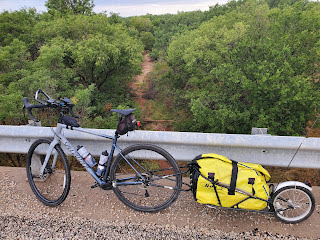Why the BOB Trailer Is Still My Go-To for Long-Distance Touring
Why the BOB Trailer Is Still My Go-To for Long-Distance Touring
That is my BOB trailer behind a Specialized Diverge pictured above, somewhere in Texas.
When it comes to long-distance bike touring, the right gear isn't a luxury—it's a necessity. And one piece of gear that’s earned a permanent place in my touring setup is the BOB trailer. From New Mexico to Florida and everywhere in between, this trailer has never let me down.
Mine has seen the miles: two full tours across New Mexico, a cross-country haul from Lubbock to Pensacola.., and routes that spanned Texas from border to border. Through it all, the BOB trailer has proven one thing—it’s a workhorse.
🔧 Simplicity that Just Works
The design of the BOB trailer is brilliantly simple. It mounts to your bike’s rear axle and trails directly behind, so it doesn't throw off your balance or handling. That means even newer riders can tow it without stress. On winding roads, it stays centered. On long straights, you almost forget it's there—until you realize how much gear it’s carrying.
🛠 Built to Last
One of the things I respect most about this trailer is its durability. Rainstorms in Florida, gravel roads in Texas, snow near Cloudcroft—it’s handled all of it. The frame is rock-solid, and the included dry bag has kept my gear safe and dry through it all. After years and thousands of miles, I haven’t had to repair a single part. That’s rare these days.
🎒 More Space, Less Hassle
Compared to panniers, the BOB trailer allows you to carry larger and bulkier items—like tents, sleeping bags, extra food, or extra water for desert stretches. For self-supported tours, it’s a game changer.
⚠️ A Few Trade-Offs
Of course, no gear is perfect. The trailer adds some weight and drag, especially noticeable on long climbs or in headwinds. You’ll also want to take care when maneuvering in tight spaces or crowded areas. But after a few rides, handling becomes second nature—and the benefits far outweigh the drawbacks.
🏪 Why I Bought It at a Local Bike Shop
I purchased my BOB trailer from a local bike shop here in Texas, and I recommend you do the same. Not only do you support local businesses, but you often get expert help with assembly or adjustments. And if you're flying or shipping your bike for a tour, it breaks down easily for transport.
Check out the BOB Trailer with Dry Bag on Amazon
It’s the exact model I’ve used for years. Rugged, reliable, and worth every penny. I receive a commission for any sale through Amazon from a link in my site. That commission keeps this blog rolling. Thanks for your support.
Final Thoughts
If you're gearing up for a serious bike tour and need something you can count on, the BOB trailer delivers. It’s simple, rugged, and practical—everything a good piece of touring gear should be. I’ve tested a lot of gear I use over the years, but this one’s a standout. I wouldn’t ride long distances without it.
Related Posts
- Two Things You Need on a Long Distance Bicycle Tour
- First-Time Cyclist’s Guide: FAQs About Multi-Day Bicycle Tours
- The Best Touring Bikes for Your Next Adventure (And a Nod to My Favorite Ever)
FAQs About the BOB Trailer
Q: Can you use the BOB trailer with a carbon bike?A: Yes, but use caution. The trailer mounts at the rear axle, so ensure your bike’s dropouts and frame are rated for towing. I use it with my aluminum Specialized Diverge with no issues.
Q: Is it hard to assemble or attach?
A: Not at all. Assembly is straightforward, and it attaches with quick-release pins. Most local bike shops will help you set it up the first time.
Q: Can it be shipped or packed easily?
A: Absolutely. The frame and wheel detach quickly, and the dry bag compresses down. Perfect for shipping before a tour or packing it in a car.



Comments
Post a Comment